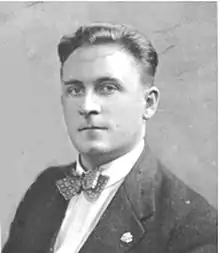Francesco Illy
Francesco Illy (Hungarian: Illy Ferenc (1892 – 1956) was a Hungarian accountant, bookkeeper, businessman, philanthropist. He founded illy and invented various coffee machinery.
Francesco Illy | |
|---|---|
 Francesco Illy | |
| Born | Ferenc Illy October 7, 1892 |
| Died | 1956 |
| Citizenship | Hungarian, Italian |
| Alma mater | Temesvári Piarista Gimnázium |
| Known for | founder of illy inventor of the Illetta (coffemachine) |
| Board member of | CEO Illycaffé |
| Spouse(s) | Vittoria |
| Children | Ernesto Hedda |
| Parents |
|
| Relatives | Riccardo Illy (grandson) Andrea Illy (grandson) |
Biography
Illy was born to a middle-class family in Temesvár, Kingdom of Hungary (now Timișoara, Romania). His father, János Illy, was a carpenter. His mother, Aloisia Rössler, was Danube Swabian. He studied economics in Temesvár. After secondary school, he moved to Vienna, where he worked for two big Transylvanian companies. At the age of 22, he was conscripted into the Austro-Hungarian Army, and served from 1914 at almost every front of the First World War, including at the Battle of Kraśnik and the Battles of the Isonzo.
After the war, he stayed with his sister in Trieste, where he soon married a Triestine woman. He found work with companies dealing with cocoa and coffee roasting. He later invented his own method for maintaining the quality of freshly roasted coffee, so it could be delivered to other locations rather than roasting it on site. He formed a partnership with the local coffee manufacturers Hausbrandt.
In 1933 Illy founded illycaffè,[1] which invented the first automatic coffee machine that substituted pressurized water for steam. The Illetta became the predecessor of today's espresso machine.[2]
His son, the food chemist Ernesto Illy (1925–2008) took over the management of the coffee company, which is now in the hands of the third generation Illys.
References
- Stein, Nicholas (9 December 2009). "Crisis in a Coffee Cup". Fortune magazine. Retrieved 25 April 2009.
- Tagliabue, John (26 December 2006). "Coffeehouses as Fashion Boutiques; Selling Cachet by the Cup". The New York Times. Retrieved 25 April 2009.